Hiroshima -- the Liveliest” city in Japan
高级英语上册Unit 02

Unit 1 Hiroshima – the “Liveliest” City in Japan P 01(1) “广岛车站到了,大家请下车!”当世界上最快的列车缓缓驶进广岛车站并渐渐停稳时,那位身着日式站长制服的男人喊出的一定是这样一句话。
“Hiroshima! Everybody off!”That must be what the man inthe Japanese stationmaster’s uniform shouted, as the fastesttrain in the world slipped to a stop in Hiroshima Station.(2) 我听不懂他的话,首先因为他是用日语喊的;其次是因为我当时心情沉重,喉咙哽咽,忧思连绵,我心中所想的同日本铁路工作人员说什么毫不相干。
I did not understand what he was saying. First of all, becausehe was shouting in Japanese. And secondly, because I had alump in my throat and a lot of sad thoughts on my mind thathad little to do with anything a Nippon railways official mightsay.(3) 对我来说,踏上广岛的土地,呼吸着这里的空气,这件事本身就非常激动人心,其意义远远超过我以往的任何一次旅行或采访活动。
我真的是在曾经的犯罪现场吗?The very act of stepping on this soil, in breathing this air ofHiroshima, was for me a far greater adventure than any trip orany reportorial assignment I’d previously taken. Was I not atthe scene of the crime?P 02(4) 这儿的日本人看上去倒没有像我一样的忧伤情绪。
(完整word版)Lesson 2 Hiroshima-the Liveliest City in Japan课文翻译
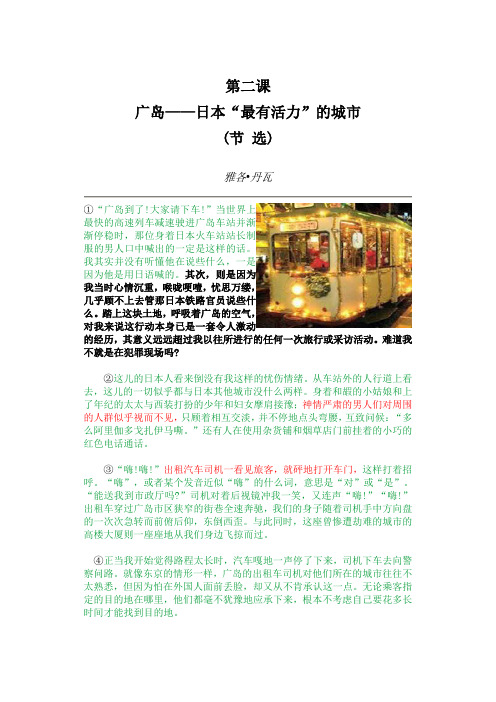
第二课广岛——日本“最有活力”的城市(节选)雅各•丹瓦①“广岛到了!大家请下车!”当世界上最快的高速列车减速驶进广岛车站并渐渐停稳时,那位身着日本火车站站长制服的男人口中喊出的一定是这样的话。
我其实并没有听懂他在说些什么,一是因为他是用日语喊的。
其次,则是因为我当时心情沉重,喉咙哽噎,忧思万缕,几乎顾不上去管那日本铁路官员说些什么。
踏上这块土地,呼吸着广岛的空气,对我来说这行动本身已是一套令人激动的经历,其意义远远超过我以往所进行的任何一次旅行或采访活动。
难道我不就是在犯罪现场吗?②这儿的日本人看来倒没有我这样的忧伤情绪。
从车站外的人行道上看去,这儿的一切似乎都与日本其他城市没什么两样。
身着和嘏的小姑娘和上了年纪的太太与西装打扮的少年和妇女摩肩接豫;神情严肃的男人们对周围的人群似乎视而不见,只顾着相互交淡,并不停地点头弯腰,互致问候:“多么阿里伽多戈扎伊马嘶。
”还有人在使用杂货铺和烟草店门前挂着的小巧的红色电话通话。
③“嗨!嗨!”出租汽车司机一看见旅客,就砰地打开车门,这样打着招呼。
“嗨”,或者某个发音近似“嗨”的什么词,意思是“对”或“是”。
“能送我到市政厅吗?”司机对着后视镜冲我一笑,又连声“嗨!”“嗨!”出租车穿过广岛市区狭窄的街巷全速奔驰,我们的身子随着司机手中方向盘的一次次急转而前俯后仰,东倒西歪。
与此同时,这座曾惨遭劫难的城市的高楼大厦则一座座地从我们身边飞掠而过。
④正当我开始觉得路程太长时,汽车嘎地一声停了下来,司机下车去向警察问路。
就像东京的情形一样,广岛的出租车司机对他们所在的城市往往不太熟悉,但因为怕在外国人面前丢脸,却又从不肯承认这一点。
无论乘客指定的目的地在哪里,他们都毫不犹豫地应承下来,根本不考虑自己要花多长时间才能找到目的地。
⑤这段小插曲后来终于结束了,我也就不知不觉地突然来到了宏伟的市政厅大楼前。
当我出示了市长应我的采访要求而发送的请柬后,市政厅接待人员向我深深地鞠了一躬,然后声调悠扬地长叹了一口气。
Lesson 2 Hiroshima-the Liveliest City in Japan修辞学习
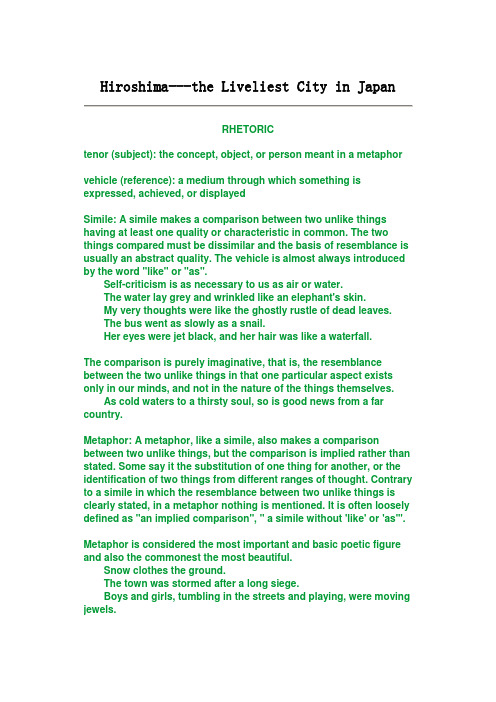
Hiroshima---the Liveliest City in JapanRHETORICtenor (subject): the concept, object, or person meant in a metaphorvehicle (reference): a medium through which something is expressed, achieved, or displayedSimile: A simile makes a comparison between two unlike things having at least one quality or characteristic in common. The two things compared must be dissimilar and the basis of resemblance is usually an abstract quality. The vehicle is almost always introduced by the word "like" or "as".Self-criticism is as necessary to us as air or water.The water lay grey and wrinkled like an elephant's skin.My very thoughts were like the ghostly rustle of dead leaves.The bus went as slowly as a snail.Her eyes were jet black, and her hair was like a waterfall.The comparison is purely imaginative, that is, the resemblance between the two unlike things in that one particular aspect exists only in our minds, and not in the nature of the things themselves.As cold waters to a thirsty soul, so is good news from a far country.Metaphor: A metaphor, like a simile, also makes a comparison between two unlike things, but the comparison is implied rather than stated. Some say it the substitution of one thing for another, or the identification of two things from different ranges of thought. Contrary to a simile in which the resemblance between two unlike things is clearly stated, in a metaphor nothing is mentioned. It is often loosely defined as "an implied comparison", " a simile without 'like' or 'as'". Metaphor is considered the most important and basic poetic figure and also the commonest the most beautiful.Snow clothes the ground.The town was stormed after a long siege.Boys and girls, tumbling in the streets and playing, were moving jewels.I had a lump in my throatAt last this intermezzo came to an end...I was again crushed by the thought......when the meaning ... sank in, jolting me...Metonymy(借代): In Latin, meta means change while onyma means name, so metonymy means the change of name. Metonymy is a figure of speech that has to do with the substitution of the name of one thing for that of another. This substituted name may be an attribute of that other thing or be closely associated with it. In other words, it involves a change of name.She was a girl who excited the emotions, but I was not one to let my heart rule my head.He took to the bottle....little old Japan adrift amid beige concreteskyscrapers ...struggle between kimono and the miniskirtI thought that Hiroshima still felt the impactMetonymy can be derived from various sources:a. Names of personsUncle Sam: the USAb. Animalsthe bear: the Soviet Unionthe dragon : the Chinese (a fight between the bear and the dragon)c. Parts of the bodyheart: feelings and emotionshead, brain: wisdom, intelligence, reasongrey hair: old aged. Profession:the press: newspapers, reporters etc.He met the press yesterday evening at the Grand Hotel.the bar: the legal professione. location of government, business etc.Downing Street: the British Governmentthe White House: the US president and his governmentthe Capital Hill: US CongressWall Street: US financial circlesHollywood: American filmmaking industryEuphemism: the substitution of an agreeable or inoffensive expression for one that may offend or suggest sth unpleasant eg:He was sentenced to prison---He is now living at the government's expenses.The boy is a bit slow for his age.to go to heaven---deadto go to the bathroom, do one's business, answer the nature's call, put an end to my life.Each day of suffering that helps to free me from earthly cares. Irony:Hiroshima---the Liveliest City in Japanthe good fortune that my illness has brought meAnti-Climax: 渐降法,虎头蛇尾a town known throughout the world for its---oysters Alliteration:slip to a stoptested and treatedRhetorical QuestionWas I not at the scene of the crime?。
高级英语lesson2课文翻译
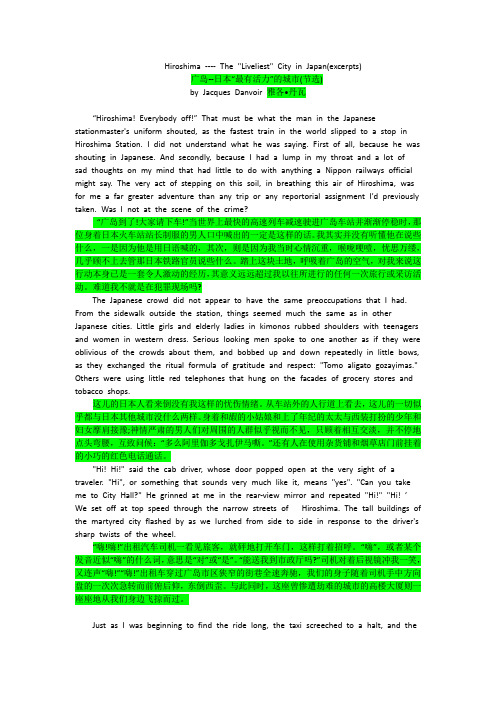
Hiroshima ---- The "Liveliest" City in Japan(excerpts)广岛--日本“最有活力”的城市(节选)by Jacques Danvoir 雅各•丹瓦“Hiroshima!Everybody off!”That must be what the man in the Japanese stationmaster's uniform shouted, as the fastest train in the world slipped to a stop in Hiroshima Station. I did not understand what he was saying. First of all, because he was shouting in Japanese. And secondly, because I had a lump in my throat and a lot ofsad thoughts on my mind that had little to do with anything a Nippon railways official might say. The very act of stepping on this soil, in breathing this air of Hiroshima, was for me a far greater adventure than any trip or any reportorial assignment I'd previously taken. Was I not at the scene of the crime?“广岛到了!大家请下车!”当世界上最快的高速列车减速驶进广岛车站并渐渐停稳时,那位身着日本火车站站长制服的男人口中喊出的一定是这样的话。
Lesson2 Hiroshima-the Liveliest City in Japan(Excerpts)
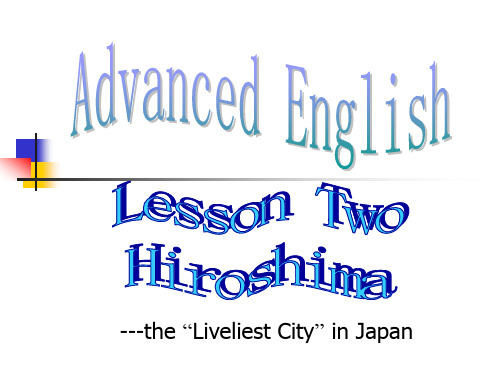
Hiroshima
The A-bomb destroyed almost everything within a radius of 6000 to 8000 feet (18302450 meters) and killed 71000+people. Many more people later died of injuries and the effects of radiation. Survivors are still dying of leukemia, pernicious anemia and other diseases induced by radiation. Almost 98% of the buildings were destroyed or severely damaged.
Hiroshima
After the war, the Japanese dedicated postwar Hiroshima to peace. The ruins of the Institute of Industrial Development, with its warped dome, were preserved as a symbol of the terror of destruction. Peace Park was built. A special hospital was set up. The city now is an important producer of iron and steel, motor vehicles, tractors, ships, machinery, sewing needles, paper, textiles, and food products.
高级英语第二册课文
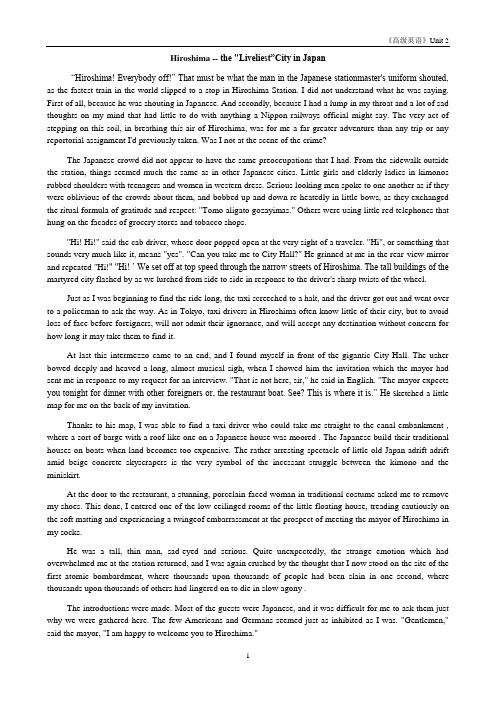
Hiroshima -- the "Liveliest”City in Japan“Hiroshima! Everybody off!” That must be what the man in the Japanese stationmaster's uniform shouted, as the fastest train in the world slipped to a stop in Hiroshima Station. I did not understand what he was saying. First of all, because he was shouting in Japanese. And secondly, because I had a lump in my throat and a lot of sad thoughts on my mind that had little to do with anything a Nippon railways official might say. The very act of stepping on this soil, in breathing this air of Hiroshima, was for me a far greater adventure than any trip or any reportorial assignment I'd previously taken. Was I not at the scene of the crime?The Japanese crowd did not appear to have the same preoccupations that I had. From the sidewalk outside the station, things seemed much the same as in other Japanese cities. Little girls and elderly ladies in kimonos rubbed shoulders with teenagers and women in western dress. Serious looking men spoke to one another as if they were oblivious of the crowds about them, and bobbed up and down re-heatedly in little bows, as they exchanged the ritual formula of gratitude and respect: "Tomo aligato gozayimas." Others were using little red telephones that hung on the facades of grocery stores and tobacco shops."Hi! Hi!" said the cab driver, whose door popped open at the very sight of a traveler. "Hi", or something that sounds very much like it, means "yes". "Can you take me to City Hall?" He grinned at me in the rear-view mirror and repeated "Hi!" "Hi! ’ We set off at top speed through the narrow streets of Hiroshima. The tall buildings of the martyred city flashed by as we lurched from side to side in response to the driver's sharp twists of the wheel.Just as I was beginning to find the ride long, the taxi screeched to a halt, and the driver got out and went over to a policeman to ask the way. As in Tokyo, taxi drivers in Hiroshima often know little of their city, but to avoid loss of face before foreigners, will not admit their ignorance, and will accept any destination without concern for how long it may take them to find it.At last this intermezzo came to an end, and I found myself in front of the gigantic City Hall. The usher bowed deeply and heaved a long, almost musical sigh, when I showed him the invitation which the mayor had sent me in response to my request for an interview. "That is not here, sir," he said in English. "The mayor expects you tonight for dinner with other foreigners or, the restaurant boat. See? This is where it is.” He s ketched a little map for me on the back of my invitation.Thanks to his map, I was able to find a taxi driver who could take me straight to the canal embankment , where a sort of barge with a roof like one on a Japanese house was moored . The Japanese build their traditional houses on boats when land becomes too expensive. The rather arresting spectacle of little old Japan adrift adrift amid beige concrete skyscrapers is the very symbol of the incessant struggle between the kimono and the miniskirt.At the door to the restaurant, a stunning, porcelain-faced woman in traditional costume asked me to remove my shoes. This done, I entered one of the low-ceilinged rooms of the little floating house, treading cautiously on the soft matting and experiencing a twingeof embarrassment at the prospect of meeting the mayor of Hiroshima in my socks.He was a tall, thin man, sad-eyed and serious. Quite unexpectedly, the strange emotion which had overwhelmed me at the station returned, and I was again crushed by the thought that I now stood on the site of the first atomic bombardment, where thousands upon thousands of people had been slain in one second, where thousands upon thousands of others had lingered on to die in slow agony .The introductions were made. Most of the guests were Japanese, and it was difficult for me to ask them just why we were gathered here. The few Americans and Germans seemed just as inhibited as I was. "Gentlemen," said the mayor, "I am happy to welcome you to Hiroshima."Everyone bowed, including the Westerners. After three days in Japan, the spinal column becomes extraordinarily flexible."Gentlemen, it is a very great honor to have you her e in Hiroshima."There were fresh bows, and the faces grew more and more serious each time the name Hiroshima was repeated."Hiroshima, as you know, is a city familiar to everyone,” continued the mayor."Yes, yes, of course,” murmured the company, more and more agitated."Seldom has a city gained such world renown, and I am proud and happy to welcome you to Hiroshima, a town known throughout the world for its--- oysters".I was just about to make my little bow of assent, when the meaning of these last words sank in, jolting me out of my sad reverie ."Hiroshima – oysters? What about the bomb and the misery and humanity's most heinous crime?" While the mayor went on with his speech in praise of southern Japanese sea food, I cautiously backed away and headed toward the far side of the room, where a few men were talking among themselves and paying little attention to the mayor's speech. "You look puzzled," said a small Japanese man with very large eye-glasses."Well, I must confess that I did not expect a speech about oysters here. I thought that Hiroshima still felt the impact of the atomic impact .""No one talks about it any more, and no one wants to, especially, the people who were born here or who lived through it. "Do you feel the same way, too?""I was here, but I was not in the center of town. I tell you this because I am almost an old man. There are two different schools of thought in this city of oysters, one that would like to preserve traces of the bomb, and the other that would like to get rid of everything, even the monument that was erected at the point of impact. They would also like to demolish the atomic museum.""Why would they want to do that?""Because it hurts everybody, and because time marches on. That is why." The small Japanese man smiled, his eyes nearly closed behind their thick lenses. "If you write about this city, do not forget to say that it is the gayest city in Japan, even it many of the town's people still bear hidden wounds, and burns."Like any other, the hospital smelled of formaldehyde and ethere . Stretchers and wheelchairs lined the walls of endless corridors, and nurses walked by carrying Stretchers instruments, the very sight of which would send shivers down the spine of any healthy visitor. The so-called atomic section was located on the third floor. It consisted of 17 beds."I am a fisherman by trade. I have been here a very long time, more than twenty years, "said an old man in Japanese pajamas. “What is wrong with you?”"Something inside. I was in Hiroshima when it happened. I saw the fire ball. But I had no burns on my face or body. I ran all over the city looking for missing friends and relatives. I thought somehow I had been spared. But later my hair began to fall out, and my belly turned to water. I felt sick, and ever since then they have been testing and treating me. "The doctor at my side explained and commented upon the old man's story, "We still hare a handful of patients here who are being kept alive by constant car e. The other s died as a result of their injuries, or else committed suicide. ""Why did they commit suicide?""It is humiliating to survive in this city. If you bear any visible scars of atomic burns, your children will encounter prejudice on the par t of those who do not. No one will marry the daughter or the niece of an atomic bomb victim. People are afraid of genetic damage from the radiation." The old fisherman gazed at me politely and with interest.Hanging over the patient was a big ball made of bits of brightly colored paper, folded into the shape of tiny birds. "What's that?" I asked."Those are my lucky birds. Each day that I escape death, each day of suffering that helps to free me from earthly cares, I make a new little paper bird, and add it to the others. This way I look at them and congratulate myself of the good fortune that my illness has brought me. Because, thanks to it, I have the opportunity to improve my character."Once again, outside in the open air, I tore into little pieces a small notebook with questions that I'd prepared in advance for inter views with the patients of the atomic ward. Among them was the question: Do you really think that Hiroshima is the liveliest city in Japan? I never asked it. But I could read the answer in every eye.ExercisesI.Give brief answers to the following questions, using your own words as much as possible:1) Can you guess the writer's occupation, and perhaps, his nationality?2) What do you think was the aim of the visit?3) What thoughts were on his mind? Were there other visitors from abroad? Did they share his views? How do you know?4) What was his attitude towards Hiroshima?5) Were the Japanese preoccupied with the same thoughts as the writer was ?6) Was Hiroshima in any way different from other Japanese cities?7) The bomb was dropped on Hiroshima in August 1945. How has the city been rebuilt since then?8) Even in this short description one may find some of the problems of Japan, or at least, of Hiroshima. Can you say what they are?9) Why didn' t the writer ask the patients of the atomic ward the questions he had prepared in advance?10) What was the answer he read in every eyeⅡ .Paraphrase:1) Serious looking men spoke to one another as if they were oblivious of the crowds about them.2) The cab driver’ s doo r popped open at the very sight of a traveler.3) The rather arresting spectacle of little old Japan adrift amid beige concrete skyscrapers is the very symbol of the incessant struggle between the kimono and the miniskirt.4) I experienced a twinge of embarrassment at the prospect of meeting the mayor of Hiroshima in my socks.5) The few Americans and Germans seemed just as inhibited as I was.6) After three days in Japan, the spinal column becomes extraordinarily flexible.7) I was about to make my little bow of assent, when the meaning of these last words sank in, jolting me out of my sad reverie.8) I thought somehow I had been spared.III .Translate the following into Chinese:1) And secondly, because I had a lump in my throat and a lot of sad thoughts on my mind that had little to do with anything a Nippon railways official might say. The very act of stepping on this soil, in breathing this air ofHiroshima, was for me a far greater adventure than any trip or any reportorial assignment I' d previously taken. Was 1 not at the scene of the crime?2) Quite unexpectedly, the strange emotion which had over-whelmed me at the station returned, and I was again crushed by the thought that I now stood on the site of the first atomic bombardment, where thousands upon thousands of people had been slain in one second, where thousands upon thou-sands of others had lingered on to die in slow agony.3) “There are two different schools of thought in this city of oysters, one that would like to preserve traces of the bomb, and the other that would like to get rid of everything, even the monument that was erected at the point of impact."4) "If you bear any visible scars of atomic burns, your children will encounter prejudice on the part of those who do not."5) "Each day that I escape death, each day of suffering that helps to free me from earthly cares, I make a new little paper bird, and add it to the others. This way I look at them and congratulate myself on the good fortune that illness has brought me. Because, thanks to it, I have the opportunity to improve my character. "IV.Explain how the following adjectives are formed. Give examples to illustrate the different ways of compounding adjectives.1) timesaving, painstaking 2) man-made, poverty-stricken3) carefree, snow-white 4) porcelain-faced, chicken-hearted5) sad-eyed, low-ceilinged 6) longstanding, good-looking7) full-fledged, ready-madeV .Explain how the meaning of the following sentences is affected when the italicized words are replaced with the words in brackets. Pay attention to the shades of meaning of the words.1) That must be what the man shouted. (was)2) Was I not at the scene of the crime? ( Was I at the scene...?)3) Elderly ladies rubbed shoulders with teen-agers. (old)4) He grinned at me in the rear-view mirror. (smiled, laughed)5) He sketched a little map on the back of my invitation. (drew)6) I treaded cautiously on the tatami matting. (carefully)7) I stood on the site of the first atomic bombardment. (spot)8) They would also like to demolish the atomic museum. (destroy)9) It is the gayest city in Japan. (most delightful)10) The old fisherman gazed at me politely and with interest.( stared)VI. Replace the italicized words with simple, everyday words:1) The very act... was for me a far greater adventure than any trip or any reportorial assignment I’ d previously taken. ( )2) as if they were oblivious of the crowds about them ( )3) Others were using little red telephones that hung on the facades of grocery stores and tobacco shops. ( )4) The rather arresting spectacle of little old Japan adrift amid beige concrete skyscrapers is the very symbol of the incessant struggle between the kimono and the miniskirt. ( ) ( ) ( )5) and experiencing a twinge of embarrassment at the prospect of meeting the mayor of Hiroshima in my socks( ) ( )6) where thousands upon thousands of people had been slain in one second ( )7) where thousands upon thousands of others had lingered on to die in slow agony ( )8) Seldom has a city gained such world renown. ( )9) jolting me out of my sad reverie ( )10) I thought that Hiroshima still felt the impact of the atomic cataclysm. ( )11) They would also like to demolish the atomic museum.( )12) your children will encounter prejudice on the part of those who do not ( )VII. Translate the following into Chinese:1) What he said just now had little to do with the question under discussion.2) The site of the battle brought back to him memories of the fiery year s of the Anti-Japanese War.3) He was so absorbed in his work that he was oblivious of the goings-on around him.4) The newspaper reporters got excited at the very sight of the Nobel Prize winner.5) -- What was the word the teacher used? I didn' t quite catch it.-- Nor did I, but it sounded very much like "preoccupation".6) Another turn and we found ourselves in a spacious cavern bigenough to hold a couple of hundred people.7) People listened with open-mouthed astonishment while the shocking news sank in.8) Molten iron is poured into the mixer much in the same way as tea is poured into a cup from a teapot.9) The unsuccessful operation weighed heavily on the young surgeon' s mind.10) The general often went to the barracks and rubbed shoulders with the rank and file.VIII. Choose the right words to complete the following sentences and make changes where necessary.1) Since the conference was held on Chinese ___, security was no problem. (soil, earth)2) The ____ here is sandy, and therefore, very poor. (soil, earth)3) He is so strong that he can carry four basketfuls of at a time. (soil, earth)4) He is a down-to- sort of fellow. (soil, earth)5) His face is _ __ me, but I can’ t recall his name. (familiar with, familiar to)6) Are you _ _ these technical terms? (familiar with, familiar to)7) I was ___when he told me that he and his brother were born on the same day but were not twins. "We have a sister of the same age, you see' so we are triplets!” He grinned at me and said. (surprise, puzzle)8) As the Chinese table-tennis players are the best in the world, it was not _ that they took away most of the cups. (surprising, puzzling)9) He is vain and seldom his mistakes. (admit, confess)10) As the offender his crime, he was dealt with leniently. (admit, confess)11) The doctor gave the old man a ___ examination and congratulated him on his speedy recovery. (careful, cautious)12) The troops advanced because the area had been mined by the enemy. (carefully, cautiously)Ⅸ .Translate the following into English (using the following words or expressions: by trade, to spare, to be oblivious of, to have... to do, mind, very much like, much the same as, to rub shoulders, to smell of, to sink in, very, must):1) 礼堂里一个人都没有,会议一定是延期了。
高级英语 段落翻译
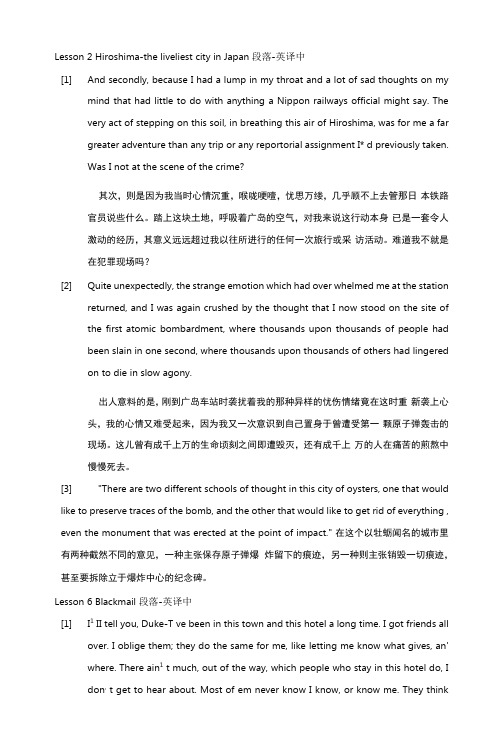
Lesson 2 Hiroshima-the liveliest city in Japan段落-英译中[1]And secondly, because I had a lump in my throat and a lot of sad thoughts on mymind that had little to do with anything a Nippon railways official might say. The very act of stepping on this soil, in breathing this air of Hiroshima, was for me a far greater adventure than any trip or any reportorial assignment I* d previously taken.Was I not at the scene of the crime?其次,则是因为我当时心情沉重,喉咙哽噎,忧思万缕,几乎顾不上去管那日本铁路官员说些什么。
踏上这块土地,呼吸着广岛的空气,对我来说这行动本身已是一套令人激动的经历,其意义远远超过我以往所进行的任何一次旅行或采访活动。
难道我不就是在犯罪现场吗?[2]Quite unexpectedly, the strange emotion which had over whelmed me at the stationreturned, and I was again crushed by the thought that I now stood on the site of the first atomic bombardment, where thousands upon thousands of people had been slain in one second, where thousands upon thousands of others had lingered on to die in slow agony.出人意料的是,刚到广岛车站时袭扰着我的那种异样的忧伤情绪竟在这时重新袭上心头,我的心情又难受起来,因为我又一次意识到自己置身于曾遭受第一颗原子弹轰击的现场。
高级英语第一册课文翻译和词汇

高级英语(第三版)第一册课文译文和词汇张汉熙版Lesson 2 Hiroshima - The "Liveliest" City in Japan(experts)广岛--日本“最有活力”的城市(节选) 雅各•丹瓦“广岛到了!大家请下车!”当世界上最快的高速列车减速驶进广岛车站并渐渐停稳时,那位身着日本火车站站长制服的男人口中喊出的一定是这样的话。
我其实并没有听懂他在说些什么,一是因为他是用日语喊的,其次,则是因为我当时心情沉重,喉咙哽噎,忧思万缕,几乎顾不上去管那日本铁路官员说些什么。
踏上这块土地,呼吸着广岛的空气,对我来说这行动本身已是一套令人激动的经历,其意义远远超过我以往所进行的任何一次旅行或采访活动。
难道我不就是在犯罪现场吗?这儿的日本人看来倒没有我这样的忧伤情绪。
从车站外的人行道上看去,这儿的一切似乎都与日本其他城市没什么两样。
身着和嘏的小姑娘和上了年纪的太太与西装打扮的少年和妇女摩肩接豫;神情严肃的男人们对周围的人群似乎视而不见,只顾着相互交淡,并不停地点头弯腰,互致问候:“多么阿里伽多戈扎伊马嘶。
”还有人在使用杂货铺和烟草店门前挂着的小巧的红色电话通话。
“嗨!嗨!”出租汽车司机一看见旅客,就砰地打开车门,这样打着招呼。
“嗨”,或者某个发音近似“嗨”的什么词,意思是“对”或“是”。
“能送我到市政厅吗?”司机对着后视镜冲我一笑,又连声“嗨!”“嗨!”出租车穿过广岛市区狭窄的街巷全速奔驰,我们的身子随着司机手中方向盘的一次次急转而前俯后仰,东倒西歪。
与此同时,这座曾惨遭劫难的城市的高楼大厦则一座座地从我们身边飞掠而过。
正当我开始觉得路程太长时,汽车嘎地一声停了下来,司机下车去向警察问路。
就像东京的情形一样,广岛的出租车司机对他们所在的城市往往不太熟悉,但因为怕在外国人面前丢脸,却又从不肯承认这一点。
无论乘客指定的目的地在哪里,他们都毫不犹豫地应承下来,根本不考虑自己要花多长时间才能找到目的地。
高级英语课件第一册第二课Hiroshima----the-Liveliest-City-in-Jap

• It is believed that more than 140,000 people died by the end of the year. The total number of people who have died due to the bomb is estimated to be 200,000.
2) To acquaint students with Japan and her traditions revealed in the text.
3) To enable students to appreciate the reportorial writing, i.e. facts and opinions.
• We spent the night in Yasu Shrine in Gion. Because of their burns, everyone was crying for water all night. The next morning, we were taken by truck to a Buddhist temple in Kabe. That night, my sister died. How can I describe Mother‘s grief ? How can I describe the horrible scenes I saw in the temple then? Who can imagine the miseries we went through except those who were there themselves? It is entirely beyond my power to put the terrible sight into words. Countless people suffering from burns and wounds, groaning with pain, their bodies covered with maggots(蛆), and dying in delirium(精神 错乱), one after another. It was hell on earth.
第二课 Hiroshima - The Liveliest City in Japan

第二课广岛--日本“最有活力”的城市(节选)雅各•丹瓦“广岛到了!大家请下车!”当世界上最快的高速列车减速驶进广岛车站并渐渐停稳时,那位身着日本火车站站长制服的男人口中喊出的一定是这样的话。
我其实并没有听懂他在说些什么,一是因为他是用日语喊的,其次,则是因为我当时心情沉重,喉咙哽噎,忧思万缕,几乎顾不上去管那日本铁路官员说些什么。
踏上这块土地,呼吸着广岛的空气,对我来说这行动本身已是一套令人激动的经历,其意义远远超过我以往所进行的任何一次旅行或采访活动。
难道我不就是在犯罪现场吗?这儿的日本人看来倒没有我这样的忧伤情绪。
从车站外的人行道上看去,这儿的一切似乎都与日本其他城市没什么两样。
身着和嘏的小姑娘和上了年纪的太太与西装打扮的少年和妇女摩肩接豫;神情严肃的男人们对周围的人群似乎视而不见,只顾着相互交淡,并不停地点头弯腰,互致问候:“多么阿里伽多戈扎伊马嘶。
”还有人在使用杂货铺和烟草店门前挂着的小巧的红色电话通话。
“嗨!嗨!”出租汽车司机一看见旅客,就砰地打开车门,这样打着招呼。
“嗨”,或者某个发音近似“嗨”的什么词,意思是“对”或“是”。
“能送我到市政厅吗?”司机对着后视镜冲我一笑,又连声“嗨!”“嗨!”出租车穿过广岛市区狭窄的街巷全速奔驰,我们的身子随着司机手中方向盘的一次次急转而前俯后仰,东倒西歪。
与此同时,这座曾惨遭劫难的城市的高楼大厦则一座座地从我们身边飞掠而过。
正当我开始觉得路程太长时,汽车嘎地一声停了下来,司机下车去向警察问路。
就像东京的情形一样,广岛的出租车司机对他们所在的城市往往不太熟悉,但因为怕在外国人面前丢脸,却又从不肯承认这一点。
无论乘客指定的目的地在哪里,他们都毫不犹豫地应承下来,根本不考虑自己要花多长时间才能找到目的地。
这段小插曲后来终于结束了,我也就不知不觉地突然来到了宏伟的市政厅大楼前。
当我出示了市长应我的采访要求而发送的请柬后,市政厅接待人员向我深深地鞠了一躬,然后声调悠扬地长叹了一口气。
Hiroshima,theliveliestcityinJapan
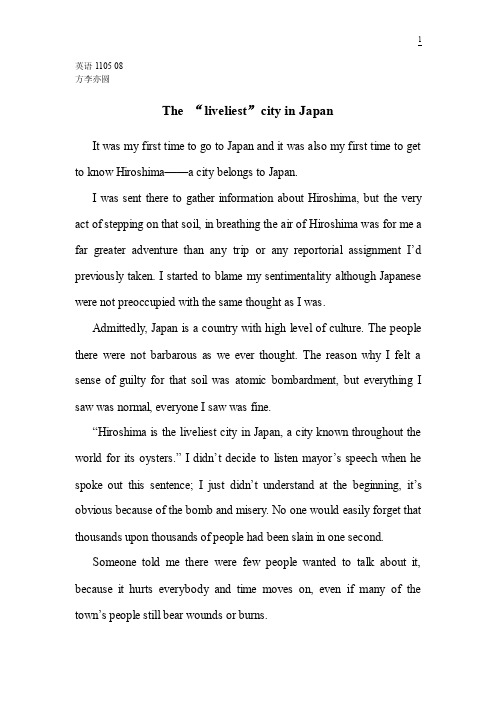
英语1105 08方李亦圆The “liveliest”city in JapanIt was my first time to go to Japan and it was also my first time to get to know Hiroshima——a city belongs to Japan.I was sent there to gather information about Hiroshima, but the very act of stepping on that soil, in breathing the air of Hiroshima was for me a far greater adventure than any trip or any reportorial assignment I’d previously taken. I started to blame my sentimentality although Japanese were not preoccupied with the same thought as I was.Admittedly, Japan is a country with high level of culture. The people there were not barbarous as we ever thought. The reason why I felt a sense of guilty for that soil was atomic bombardment, but everything I saw was normal, everyone I saw was fine.“Hiroshima is the liveliest city in Japan, a city known throughout the world for its oysters.” I didn’t decide to listen mayor’s speech when he spoke out this sentence; I just didn’t understand at the beginning, it’s obvious because of the bomb and misery. No one would easily forget that thousands upon thousands of people had been slain in one second.Someone told me there were few people wanted to talk about it, because it hurts everybody and time moves on, even if many of the town’s people still bear wounds or burns.Another news what shocked me was some committed suicide as a result of their injuries. They said it was humiliating to survive, because of prejudice for the scars.Patients there who suffered the atomic disaster unexpectedly had a feeling of happiness. But I don’t appreciate their optimism. It is not so much positive or optimistic as self-deception from heads of state and heads of government, right down to civilians.It is not a bad thing to move on, but it i s history, it’s a matter of fact. It’s the people who suffered the most pain both in mind and body. They have the right to choose forget but they cannot pretend to be live a good life. What I saw from their eyes was pain, helplessness even despair.It was unnecessary to ask the question I prepared before, because they have tried their best to hide the miserable experience and memory, it’s their last dignity.War always brings much pain to people they can’t bear, it’s cruel to reopen old wounds. I am sorry for what my country did to Japan, to Hiroshima ever before.。
Hiroshima -- the “Liveliest” City in Japan
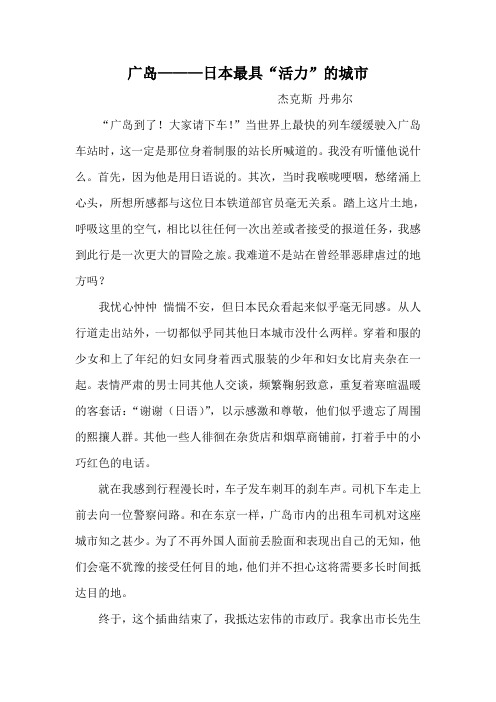
广岛———日本最具“活力”的城市杰克斯丹弗尔“广岛到了!大家请下车!”当世界上最快的列车缓缓驶入广岛车站时,这一定是那位身着制服的站长所喊道的。
我没有听懂他说什么。
首先,因为他是用日语说的。
其次,当时我喉咙哽咽,愁绪涌上心头,所想所感都与这位日本铁道部官员毫无关系。
踏上这片土地,呼吸这里的空气,相比以往任何一次出差或者接受的报道任务,我感到此行是一次更大的冒险之旅。
我难道不是站在曾经罪恶肆虐过的地方吗?我忧心忡忡惴惴不安,但日本民众看起来似乎毫无同感。
从人行道走出站外,一切都似乎同其他日本城市没什么两样。
穿着和服的少女和上了年纪的妇女同身着西式服装的少年和妇女比肩夹杂在一起。
表情严肃的男士同其他人交谈,频繁鞠躬致意,重复着寒暄温暖的客套话:“谢谢(日语)”,以示感激和尊敬,他们似乎遗忘了周围的熙攘人群。
其他一些人徘徊在杂货店和烟草商铺前,打着手中的小巧红色的电话。
就在我感到行程漫长时,车子发车刺耳的刹车声。
司机下车走上前去向一位警察问路。
和在东京一样,广岛市内的出租车司机对这座城市知之甚少。
为了不再外国人面前丢脸面和表现出自己的无知,他们会毫不犹豫的接受任何目的地,他们并不担心这将需要多长时间抵达目的地。
终于,这个插曲结束了,我抵达宏伟的市政厅。
我拿出市长先生答复我采访要求的邀请函。
门卫深深的鞠了一躬并随之发出一声长长的、几乎是悦耳的叹息。
“不是这个地方”他用英语说到。
“市长先生希望你和其他外宾在驳船宾馆就餐。
看见了吗?在这里。
”他在邀请函的背面草草花了一个地图。
多亏了他给我画的草图我才能找到一个司机直接将我送往运河大堤。
堤坝旁边停泊着顶部像日本房屋的屋顶一样的驳船。
当土地变得十分昂贵的时候,日本人将房子建在船上。
古老狭小的日本大地上,传统和服和现代迷你裙交融在米黄色的摩登大厦中间,格外显眼,引人注目。
在进入宾馆的时候,一位漂亮但脸色凝重身着传统服饰服务员小姐让我脱掉鞋子。
之后,我走进了穿上一间低天花板房间。
Hiroshima-theliveliestcityintheworld翻译doc
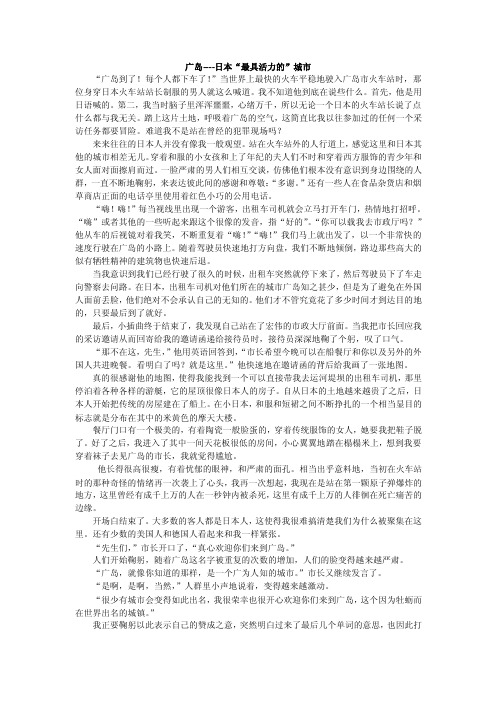
广岛----日本“最具活力的”城市“广岛到了!每个人都下车了!”当世界上最快的火车平稳地驶入广岛市火车站时,那位身穿日本火车站站长制服的男人就这么喊道。
我不知道他到底在说些什么。
首先,他是用日语喊的。
第二,我当时脑子里浑浑噩噩,心绪万千,所以无论一个日本的火车站长说了点什么都与我无关。
踏上这片土地,呼吸着广岛的空气,这简直比我以往参加过的任何一个采访任务都要冒险。
难道我不是站在曾经的犯罪现场吗?来来往往的日本人并没有像我一般观望。
站在火车站外的人行道上,感觉这里和日本其他的城市相差无几。
穿着和服的小女孩和上了年纪的夫人们不时和穿着西方服饰的青少年和女人面对面擦肩而过。
一脸严肃的男人们相互交谈,仿佛他们根本没有意识到身边围绕的人群,一直不断地鞠躬,来表达彼此间的感谢和尊敬:“多谢。
”还有一些人在食品杂货店和烟草商店正面的电话亭里使用着红色小巧的公用电话。
“嗨!嗨!”每当视线里出现一个游客,出租车司机就会立马打开车门,热情地打招呼。
“嗨”或者其他的一些听起来跟这个很像的发音,指“好的”。
“你可以载我去市政厅吗?”他从车的后视镜对着我笑,不断重复着“嗨!”“嗨!”我们马上就出发了,以一个非常快的速度行驶在广岛的小路上。
随着驾驶员快速地打方向盘,我们不断地倾倒,路边那些高大的似有牺牲精神的建筑物也快速后退。
当我意识到我们已经行驶了很久的时候,出租车突然就停下来了,然后驾驶员下了车走向警察去问路。
在日本,出租车司机对他们所在的城市广岛知之甚少,但是为了避免在外国人面前丢脸,他们绝对不会承认自己的无知的。
他们才不管究竟花了多少时间才到达目的地的,只要最后到了就好。
最后,小插曲终于结束了,我发现自己站在了宏伟的市政大厅前面。
当我把市长回应我的采访邀请从而回寄给我的邀请函递给接待员时,接待员深深地鞠了个躬,叹了口气。
“那不在这,先生,”他用英语回答到,“市长希望今晚可以在船餐厅和你以及另外的外国人共进晚餐。
看明白了吗?就是这里。
lesson 2 hiroshima the liveliest city in japan
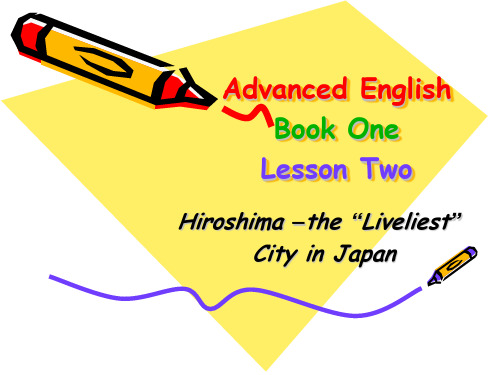
The ruins of the atomic bomb
The first atomic bomb: Little Boy Atomic cloud over Hiroshima
2nd Bombardment: Nagasaki (日本长崎市)
Mushroom cloud associated with nuclear explosions (Fat Man)
•
About the city After the Meiji Restoration(1868), Hiroshima
expanded as a modern transportation and industrial center. Major port facilities were completed by 1889, and five years later, the city was linked with Kobe and Shimonoseki by rail. Coal from northern Kyushu and from foreign sources supplied Hiroshima‘s iron and steel industry, whose products in turn were utilized in a growing engineering industry, notably in shipbuilding and the manufacture of cars and trucks. Rayon and paper were manufactured from local timber.
• The Japanese About dedicated post-war the city Hiroshima to peace. The ruins of the Institute of Industrial Development, with its warped dome, were preserved as a symbol of the terror of destruction. Peace Park, which was laid out nearby, includes a cenotaph memorializing the victims and a museum housing relics of the holocaust. A special hospital built in Hiroshima treats people suffering from exposure to radiation and conducts research into its effects. The city now is an important producer of iron and steel, motor vehicles, tractors, ships, machinery, sewing needles, paper, textiles, and food products.
高级英语02_Hiroshima – the “Liveliest” City in Japan
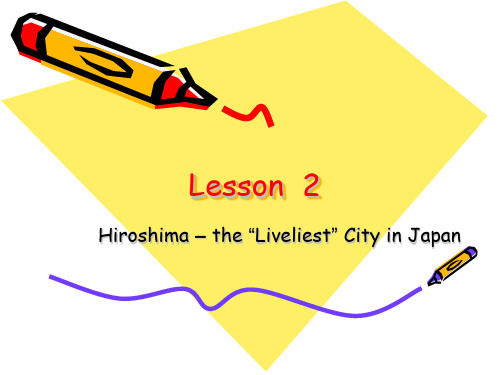
Ⅲ. Detailed study of
the text
▲ Organization of the article: Part 1: (paragraph1- 27) the author’s meeting of the mayor of the city of Hiroshima: Is the city the liveliest city? paragraph1-8: his experience from the station to the city hall. Paragraph9-27: his meeting of the mayor of the city.
Ⅳ. Appreciation of the
text
1.Effective Writing Skills 1). accurately recording the dialogues with some Japanese to reinforce the authenticity of the report 2). carefully observing and describing details to reinforce the authenticity of the report 3). vivid and humorous description to make the report interesting
3). What do we know about the cab driver and the usher? ①driver: kind hospitable knowing little of their city but paying much attention to their face.
Lesson 2 Hiroshima -- the “Liveliest” City in Japan

Advanced EnglishBook OneLesson 2 Hiroshima -- the “Liveliest” City in JapanTeaching Objectives 1. To know the background of Hiroshima & the first atomic bomb in World War II; 2. To understand the structure and grasp the main idea of the text; 3. To master the language points appeared in the unit; 4. To appreciate the reportorial writing skills and rhetoric devices of the passage; 5. To conduct a series of discussing, analyzing, presenting activities related to the theme of this essay.Global Reading B Detailed ReadingLead-inA CONTENTSCExercise & HomeworkEDPost ReadingLead-in I. Questions for Discussion What do you know about Japan? 1. geography?National Name: Nippon Geography: Four main islands: Honshu (本州), Hokkaido (北海道), Kyushu (九州), and Shikoku (四国) Area: 371,857 sq.km. Population: 126,804,433 (2010). Capital: TokyoLead inLead-in 2. history?¾After a brief war with China in 1894–1895, Japan acquired Formosa (Taiwan), the Pescadores Islands(澎湖列岛), and part of southern Manchuria. ¾In 1904–1905, Japan defeated Russia, gaining the territory of southern Sakhalin (Karafuto库页岛) and Russia's port and rail rights in Manchuria. ¾In World War I, Japan seized Germany's Pacific islands and leased areas in China. ¾1931, it invaded Manchuria, and lasted till 1945. ¾On Dec. 7, 1941, it launched Pearl Harbor attack. ¾The dropping of atomic bombs on the cities of Hiroshima and Nagasaki in 1945 by the United States finally brought the government to admit defeat. Japan surrendered formally on Sept. 2, 19453. culture?Lead-inThe kimono is the traditional dress of Japan, and it is worn nowadays on formal occasions.Lead-in¾ Sakura ( cherry) is the national flower of Japan, and there are over four hundred varieties of cherry trees in Japan. ¾ The first day of blooming in Tokyo is about 20 March, and the full bloom will be one week after from the day of first bloom.Sumo Sumo is a Japanese style of wrestling and Japan's national sport.Sado Sado(茶道), the ceremony celebrating the Way of Tea, has been much favored by Japanese high society as an artistic ceremony.Belief Buddhism (佛教) In Japan, a Buddhist monk is allowed to marry. After a reform, Buddhist monk live a life as common people.• Seafood is one of the favorite food in Japan. In Japan, oysters are called the "Milk of the sea" because of their high nutritional value and rich taste. Sushi寿司是在饭里放醋做主 材料的日本料理。
高英Hiroshima习题解

高级英语第一册Lesson 2 Hiroshima -- the "Liveliest” city in Japan(习题详解)习题全解I .1)The writer must be an American journalist or reporter.2)The aim of the visit, I think, was to gather information about Hiroshima today.3)A lot of sad thoughts were on his mind. There were other visitors from abroad who didn't share his views. The first paragraph shows this to us clearly. 4)He felt a sense of guilt.5)The Japanese were not preoccupied with the same thought as the writer was.6)Hiroshima was different from other Japanese cities in that it was destroyed by an atomic bomb on August 6, 1945.7)Since then, it has been rebuilt with hard work and with the help of education, science and technology.8)One is an obvious conflict between western influences and the traditional customs. Another is that the impact of the 1945 bomb attack is still felt or seen till now.9)Because he thought it was unnecessary to do so since the answers were obvious after his talk with the patients.10)The answer was the Hiroshima was not the liveliest city in Japan.Ⅱ .1)They were so absorbed in their conversation that they seemed not to pay any attention to the people around them.2)As soon as the taxi driver saw a traveler, he immediately opened the door.3)The traditional floating houses among high modern buildings represent the constant struggle between old tradition and new development.4)1 suffered from a strong feeling of shame when I thought of the scene of meeting the mayor of Hiroshima wearing my socks only.5)The few Americans and Germans seemed just as restrained as 1 was.6)After three days in Japan one gets quite used to bowing to people as a ritual to show gratitude.7)1 was on the point of showing my agreement by nodding when I suddenly realized what he meant.His words shocked me out my sad dreamy thinking.8)I thought for some reason or other no harm had been done to me.Ⅲ.See the translation of the text.Ⅳ.1)n.+present participle:epoch—making,face—keeping,time consuming,nerve—wracking2)n.+past participle:home—made,bedridden,sun—burnt,heartfelt3)n.+adj.:pitch—dark,headstrong,duty—free,coal—black4)n.+n.+-ed:lion-hearted,iron-fisted,wall—eyed,brick—walled5)adj.+n.+-ed:stiff-necked,highminded,dull—witted,warm—blooded,empty—headed,cold—blooded6)adj.+present participle:high—sounding,hard—working, plain-sailing,far—reaching7)adj.+past participle:high—flown,new-born,finespun, high—strungⅤ.1)was指事实如此;而must be意为“很可能”。
Lesson 2 Hiroshima-the Liveliest City in Japan课文翻译
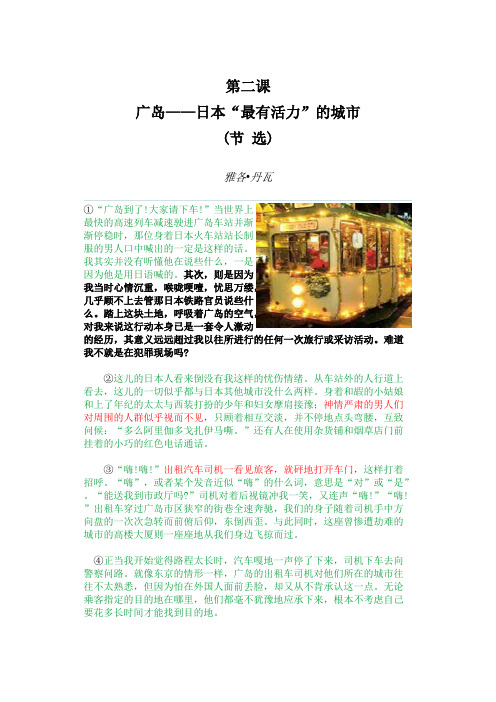
第二课广岛——日本“最有活力”的城市(节选)雅各•丹瓦①“广岛到了!大家请下车!”当世界上最快的高速列车减速驶进广岛车站并渐渐停稳时,那位身着日本火车站站长制服的男人口中喊出的一定是这样的话。
我其实并没有听懂他在说些什么,一是因为他是用日语喊的。
其次,则是因为我当时心情沉重,喉咙哽噎,忧思万缕,几乎顾不上去管那日本铁路官员说些什么。
踏上这块土地,呼吸着广岛的空气,对我来说这行动本身已是一套令人激动的经历,其意义远远超过我以往所进行的任何一次旅行或采访活动。
难道我不就是在犯罪现场吗? ②这儿的日本人看来倒没有我这样的忧伤情绪。
从车站外的人行道上看去,这儿的一切似乎都与日本其他城市没什么两样。
身着和嘏的小姑娘和上了年纪的太太与西装打扮的少年和妇女摩肩接豫;神情严肃的男人们对周围的人群似乎视而不见,只顾着相互交淡,并不停地点头弯腰,互致问候:“多么阿里伽多戈扎伊马嘶。
”还有人在使用杂货铺和烟草店门前挂着的小巧的红色电话通话。
③“嗨!嗨!”出租汽车司机一看见旅客,就砰地打开车门,这样打着招呼。
“嗨”,或者某个发音近似“嗨”的什么词,意思是“对”或“是”。
“能送我到市政厅吗?”司机对着后视镜冲我一笑,又连声“嗨!”“嗨!”出租车穿过广岛市区狭窄的街巷全速奔驰,我们的身子随着司机手中方向盘的一次次急转而前俯后仰,东倒西歪。
与此同时,这座曾惨遭劫难的城市的高楼大厦则一座座地从我们身边飞掠而过。
④正当我开始觉得路程太长时,汽车嘎地一声停了下来,司机下车去向警察问路。
就像东京的情形一样,广岛的出租车司机对他们所在的城市往往不太熟悉,但因为怕在外国人面前丢脸,却又从不肯承认这一点。
无论乘客指定的目的地在哪里,他们都毫不犹豫地应承下来,根本不考虑自己要花多长时间才能找到目的地。
⑤这段小插曲后来终于结束了,我也就不知不觉地突然来到了宏伟的市政厅大楼前。
当我出示了市长应我的采访要求而发送的请柬后,市政厅接待人员向我深深地鞠了一躬,然后声调悠扬地长叹了一口气。
- 1、下载文档前请自行甄别文档内容的完整性,平台不提供额外的编辑、内容补充、找答案等附加服务。
- 2、"仅部分预览"的文档,不可在线预览部分如存在完整性等问题,可反馈申请退款(可完整预览的文档不适用该条件!)。
- 3、如文档侵犯您的权益,请联系客服反馈,我们会尽快为您处理(人工客服工作时间:9:00-18:30)。
“Hiroshima! Everybody off!” That must be what the man in the Japanese stationmaster's uniform shouted, as the fastest train in the world slipped to a stop in Hiroshima Station. I did not understand what he was saying. First of all, because he was shouting in Japanese. And secondly, because I had a lump in my throat and a lot of sad thoughts on my mind that had little to do with anything a Nippon railways official might say. The very act of stepping on this soil, in breathing this air of Hiroshima, was for me a far greater adventure than any trip or any reportorial assignment I'd previously taken. Was I not at the scene of the crime?The Japanese crowd did not appear to have the same"Hi! Hi!" said the cab driver, whose doorJust as I was beginning to find the ride long, the taxi screeched to a halt, and the driver got out and went over to a policeman to ask the way. As in Tokyo, taxi drivers in Hiroshima often know little of their city, but to avoid loss of face before foreigners, will not admit their ignorance, and will accept any destination without concern for how long it may take them to find it.At last thisThanks to his map, I was able to find a taxi driver who could take me straight to the canalAt the door to the restaurant, aHe was a tall, thin man, sad-eyed and serious. Quite unexpectedly, the strange emotion which had overwhelmed me at the station returned, and I was againThe introductions were made. Most of the guests were Japanese, and it was difficult for me to ask them just why we were gathered here. The few Americans and Germans seemed just asEveryone bowed, including the Westerners. After three days in Japan, the"Gentlemen, it is a very great honor to have you her e in Hiroshima."There were fresh bows, and the faces grew more and more serious each time the name Hiroshima was repeated."Hiroshima, as you know, is a city familiar to everyone,” continued the mayor."Yes, yes, of course,” murmured the company, more and more"Seldom has a city gained such worldI was just about to make my little bow of"Hiroshima – oysters? What about the bomb and the misery and humanity's most"Well, I must confess that I did not expect a speech about oysters here. I thought that Hiroshima still felt the"No one talks about it any more, and no one wants to, especially, the people who were born here or who lived through it. "Do you feel the same way, too?""I was here, but I was not in the center of town. I tell you this because I am almost an old man. There are two different schools of thought in this city of oysters, one that would like to preserve traces of the bomb, and the other that would like to get rid of everything, even the monument that was erected at the point of impact. They would also like to"Why would they want to do that?""Because it hurts everybody, and because time marches on. That is why." The small Japanese man smiled, his eyes nearly closed behind their thick lenses. "If you write about this city, do not forget to say that it is the gayest city in Japan, even it many of the town's people still bear hidden wounds, and burns."Like any other, the hospital smelled of"I am a fisherman by trade. I have been here a very long time, more than twenty years, "said an old m an in Japanese pajamas. “What is wrong with you?”"Something inside. I was in Hiroshima when it happened. I saw the fire ball. But I had no burns on my face or body. I ran all over the city looking for missing friends and relatives. I thought somehow I had been spared. But later my hair began to fall out, and my belly turned to water. I felt sick, and ever since then they have been testing and treating me. " The doctor at my side explained and commented upon the old man's story, "We still hare a handful of patients here who are being kept alive by constant car e. The other s died as a result of their injuries, or else"Why did they commit suicide?""It isHanging over the patient was a big ball made of bits of brightly colored paper, folded into the shape of tiny birds. "What's that?" I asked."Those are my lucky birds. Each day that I escape death, each day of suffering that helps to free me fromBecause, thanks to it, I have the opportunity to improve my character."Once again, outside in the open air, I tore into little pieces a small notebook with questionsthat I'd prepared in advance for inter views with the patients of the atomic ward. Among them was the question: Do you really think that Hiroshima is the liveliest city in Japan? I never asked it. But I could read the answer in every eye.earthly cares, I make a new little paper bird, and add it to the others. This way I look at them and congratulate myself of the good fortune that my illness has brought me. humiliating to survive in this city. If you bear any visible scars of atomic burns, your children will encounter prejudice on the par t of those who do not. No one will marry the daughter or the niece of an atomic bomb victim. People are afraid of genetic damage from the radiation." The old fisherman gazed at me politely and with mitted suicide . "formaldehyde and ethere . Stretchers and wheelchairs lined the walls of endless corridors, and nurses walked by carrying Stretchers instruments, the very sight of which would send shivers down the spine of any healthy visitor. The so-called atomic section was located on the third floor. It consisted of 17 beds.demolish the atomic museum." impact of the atomic impact ."heinous crime?" While the mayor went on with his speech in praise of southern Japanese sea food, I cautiously backed away and headed toward the far side of the room, where a few men were talking among themselves and paying little attention to the mayor's speech. "You look puzzled," said a small Japanese man with very large eye-glasses.assent, when the meaning of these last words sank in, jolting me out of my sad reverie .renown, and I am proud and happy to welcome you to Hiroshima, a town known throughout the world for its--- oysters". agitated.spinal column becomes extraordinarily flexible.inhibitedas I was. "Gentlemen," said the mayor, "I am happy to welcome you to Hiroshima."crushed by the thought that I now stood on the site of the first atomic bombardment, where thousands upon thousands of people had been slainin one second, where thousands upon thousands of others had lingered on to die in slow agony .stunning, porcelain-faced woman in traditional costume asked me to remove my shoes. This done, I entered one of the low-ceilinged rooms of the little floating house, treading cautiously on the soft matting and experiencing a twingeof embarrassment at the prospect of meeting the mayor of Hiroshima in my socks.embankment , where a sort of barge with a roof like one on a Japanese house was moored . The Japanese build their traditional houses on boats when land becomes too expensive. The rather arresting spectacle of little old Japan adrift adrift amid beige concrete skyscrapers is the very symbol of the incessant struggle between the kimono and the miniskirt.intermezzo came to an end, and I found myself in front of the gigantic City Hall. The usher bowed deeply and heaved a long, almost musical sigh, when I showed him the invitation which the mayor had sent me in response to my request for an interview. "That is not here, sir," he said in English. "The mayor expects you tonight for dinner with other foreigners or, the restaurant boat. See? This is where it is.” He sketched a little map for me on the back of my invitation. popped open at the very sight of a traveler. "Hi", or something that sounds very much like it, means "yes". "Can you take me to City Hall?" He grinned at me in the rear-view mirror and repeated "Hi!" "Hi! ’ We set off at top speed through the narrow streets of Hiroshima. The tall buildings of the martyred city flashed by as we lurched from side to side in response to the driver's sharp twists of the wheel.preoccupations that I had. From the sidewalk outside the station, things seemed much the same as in other Japanese cities. Little girls and elderly ladies in kimonos rubbed shoulders with teenagers and women in western dress. Serious looking men spoke to one another as if they were oblivious of the crowds about them, and bobbed up and down re-heatedly in little bows, as they exchanged the ritual formula of gratitude and respect: "Tomo aligato gozayimas." Others were using little redtelephones that hung on the facades of grocery stores and tobacco shops.。
